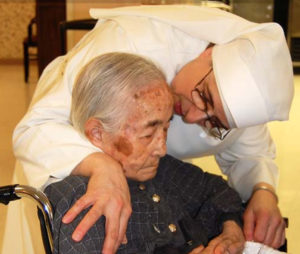 In case you haven’t heard, the Little Sisters of the Poor are now free to “offer the neediest elderly of every race and religion a home where they will be welcomed as Christ, cared for as family and accompanied with dignity until God calls them to himself.” I know, “horrible.” They should have been punished with thousands of dollars in fines, fighting them all the way to the Supreme Court. But, you know, “Trump. Ugh!”
In case you haven’t heard, the Little Sisters of the Poor are now free to “offer the neediest elderly of every race and religion a home where they will be welcomed as Christ, cared for as family and accompanied with dignity until God calls them to himself.” I know, “horrible.” They should have been punished with thousands of dollars in fines, fighting them all the way to the Supreme Court. But, you know, “Trump. Ugh!”
Although, when you think about it, the “parade of horribles” that liberal commentators predicted hasn’t really happened. As it turns out, nuns who take a vow of celibacy don’t need much contraception after all. Who knew?
Come to think of it, the Hobby Lobby decision was handed down back in 2014. Where are all the evil corporations availing themselves of “religious liberty” to oppress women? They told us they would come by the thousands, no?
I am beginning to suspect that when religious liberty flourishes, the sky doesn’t fall.
Attorney General Jeff Sessions recently released the religious liberty guidelines President Trump had requested. They, too, seem to increase liberty for all.
“Religious liberty is a foundational principle of enduring importance in America, enshrined in our Constitution and other sources of federal law,” he wrote. “Religious liberty is not merely a right to personal religious beliefs or even to worship in a sacred place. It also encompasses religious observance and practice. Except in the narrowest circumstances, no one should be forced to choose between living out his or her faith and complying with the law.”
That seems reasonable. He advises, “[T]o the greatest extent practicable and permitted by law, religious observance and practice should be reasonably accommodated in all government activity, including employment, contracting, and programming.” Well, if the government would have applied this to the Little Sisters of the Poor, things would have gone more smoothly.
Sessions gave 20 principles by which the government should abide:
- The freedom of religion is a fundamental right of paramount importance, expressly protected by federal law.
- The free exercise of religion includes the right to act or abstain from action in accordance with one’s religious beliefs.
- The freedom of religion extends to persons and organizations.
- Americans do not give up their freedom of religion by participating in the marketplace, partaking of the public square, or interacting with government.
- Government may not restrict acts or abstentions because of the beliefs they display.
- Government may not target religious individuals or entities for special disabilities based on their religion.
- Government may not target religious individuals or entities through discriminatory enforcement of neutral, generally applicable laws.
- Government may not officially favor or disfavor particular religious groups.
- Government may not interfere with the autonomy of a religious organization.
- The Religious Freedom Restoration Act of 1993 (RFRA) prohibits the federal government from substantially burdening any aspect of religious observance or practice, unless imposition of that burden on a particular religious adherent satisfies strict scrutiny.
- RFRA’s protection extends not just to individuals, but also to organizations, associations, and at least some for-profit corporations.
- RFRA does not permit the federal government to second-guess the reasonableness of a religious belief.
- A governmental action substantially burdens an exercise of religion under RFRA if it bans an aspect of an adherent’s religious observance or practice, compels an act inconsistent with that observance or practice, or substantially pressures the adherent to modify such observance or practice.
- The strict scrutiny standard applicable to RFRA is exceptionally demanding.
- RFRA applies even where a religious adherent seeks an exemption from a legal obligation requiring the adherent to confer benefits on third parties.
- Title VII of the Civil Rights Act of 1964, as amended, prohibits covered employers from discriminating against individuals on the basis of their religion.
- Title VII’s protection extends to discrimination on the basis of religious observance or practice as well as belief, unless the employer cannot reasonably accommodate such observance or practice without undue hardship on the business.
- The Clinton Guidelines on Religious Exercise and Religious Expression in the Federal Workplace provide useful examples for private employers of reasonable accommodations for religious observance and practice in the workplace.
- Religious employers are entitled to employ only persons whose beliefs and conduct are consistent with the employers’ religious precepts.
- As a general matter, the federal government may not condition receipt of a federal grant or contract on the effective relinquishment of a religious organization’s hiring exemptions or attributes of its religious character.
All seem reasonable. Maybe James Madison was right when he insisted that “all men are entitled to the full and free exercise” of religion, as he considered the Declaration of Rights for the Commonwealth of Virginia a decade or so before the First Amendment to the Constitution.
It seems that religious liberty is still liberty; protecting religious freedom, protects freedom.
I know, mind-blowing.

